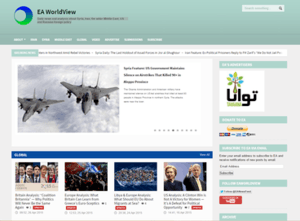EA WorldView
 | |
|
Screenshot  | |
Type of site | Intelligence |
|---|---|
| Available in | English |
| Editor | Scott Lucas |
| Website |
eaworldview |
| Alexa rank |
|
| Commercial | No |
| Registration | No |
| Launched | 2008 |
| Current status | Online |
EA WorldView is a website specializing in news coverage and analysis of Iran,[1] Syria, the wider Middle East,[2] and Russia.
History
The site was created in 2008 by Scott Lucas, a lecturer of International Politics and American Studies at the University of Birmingham, who maintains and edits the site. It was originally known as Enduring America, where its archives can still be read.
During the 2009 Iranian presidential election protests, it liveblogged the demonstrations. EA later liveblogged the civil uprising phase of the Syrian civil war.[3] With the end of the Iranian protests and as the situation in Syria moved to a complex "dynamic stalemate", EA has since moved to providing a daily updated site monitoring mainstream and social media coverage of the region, though provided a live blog of the 2013 Iranian Presidential election.
Organisation
Its partners include the University of Birmingham's Politic Science and International Studies department (which hosts its podcast Political WorldView) and University College Dublin's Clinton Institute.
Contributors and editorial team
Scott Lucas is its editor.[2]
Contributors include Liam Kennedy of University College Dublin.
Reception
Journalist Richard Spencer of The Daily Telegraph described the site as "a blog of admittedly variable quality".[4]
References
- ↑ Reuters (7 November 2012). "Obama Win Opens Iran Negotiation Window". HuffPost. Retrieved 2018-10-11.
- 1 2 "Hassan Rouhani's 'Twitter message to Jews' is at centre of Iran power struggle". The Daily Telegraph. 5 September 2013. ISSN 0307-1235. Retrieved 2018-10-11.
- ↑ Miller, James (25 July 2011). "Was Friday a Turning Point for Syria?". HuffPost. Retrieved 2018-10-11.
- ↑ Spencer, Richard (11 December 2013). "Ignore the conspiracy theories: Assad was behind the Syrian chemical weapons attack". The Daily Telegraph. Retrieved 6 May 2015.
External links
- Official website
- Enduring America – previous incarnation of the blog